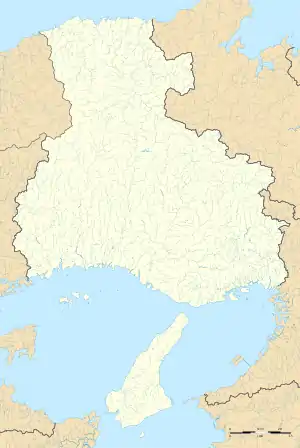Kōshienguchi Station 甲子園口駅 | |
|---|---|
 Kōshienguchi Station North exit, April 2020 | |
| General information | |
| Location | 1-36 Kōshienguchi Nichōme, Nishinomiya-shi, Hyōgo-ken 661-0025 Japan |
| Coordinates | 34°44′20.23″N 135°22′28.93″E / 34.7389528°N 135.3747028°E |
| Owned by | |
| Operated by | |
| Line(s) | |
| Distance | 569.3 km (353.7 mi) from Tokyo |
| Platforms | 2 island platforms |
| Connections |
|
| Construction | |
| Structure type | Ground level |
| Other information | |
| Status | Staffed (Midori no Madoguchi) |
| Station code | JR-A51 |
| Website | Official website |
| History | |
| Opened | 20 July 1934 |
| Passengers | |
| FY2020 | 20,761 daily |
| Location | |
 Tachibana Station Location within Hyōgo Prefecture  Tachibana Station Tachibana Station (Japan) | |

Kōshienguchi Station (甲子園口駅, Kōshienguchi-eki) is a passenger railway station located in the city of Nishinomiya, Hyōgo Prefecture, Japan. It is operated by the West Japan Railway Company (JR West).[1]Despite the station's name roughly translating to “Koshien Stadium Entrance”, it is located nowhere near the venue, and a bus is required to reach it. The name is derived from the neighborhood the station is in, which is also called Kōshienguchi despite being distant from the stadium.
Lines
Kōshienguchi Station is served by the Tōkaidō Main Line (JR Kobe Line), and is located 569.3 kilometers from the terminus of the line at Tokyo and 12.9 kilometers from Osaka.
Station layout
The station consists of two island platforms on an embankment, serving three tracks, connected by a station building at ground-level. The outer line side of the inbound line (Platform 4) is closed with stainless steel fences, but there is a space that can be removed at almost equal intervals, and it is prepared for temporary stops of group trains and outer line trains and in case of emergency. However, it has never been actually used.The station has a Midori no Madoguchi staffed ticket office.
Platforms
| 1 | ■ |
for Sannomiya and Himeji |
| 2 | ■ |
for Amagasaki, Osaka and Kitashinchi |
| 3 | ■ |
for Amagasaki, Osaka and Kitashinchi |
| 4 | ■ |
for (through traffic only) |
Adjacent stations
| « | Service | » | ||
|---|---|---|---|---|
| West Japan Railway Company (JR West) | ||||
| Tōkaidō Line (JR Kobe Line) | ||||
| Tachibana (JR-A50) | Local | Nishinomiya (JR-A52) | ||
| Rapid Service: Does not stop at this station | ||||
| Special Rapid Service: Does not stop at this station | ||||
History
Kōshienguchi Station opened on July 20, 1934. With the privatization of the Japan National Railways (JNR) on April 1, 1987, the station came under the aegis of the West Japan Railway Company.
Station numbering was introduced to the station in March 2018 with Kōshienguchi being assigned station number JR-A51.[2][3]
Passenger statistics
In fiscal 2019, the station was used by an average of 18,735 passengers daily[4]
Surrounding area
- Muko River
- Mukogawa Women's University Kamikoshien Campus (Koshien Hall)
- Koshienguchi Shopping Street
- Koshien Junior College
- Koshien Gakuin Junior and Senior High School
- Koshien Gakuin Elementary School
See also
References
- ↑ 兵庫の鉄道全駅 JR・三セク [All stations in Hyogo Prefecture] (in Japanese). Kobe Shimbun Shuppan Center. 2011. ISBN 978-4-343-00602-8.
- ↑ "近畿エリアの12路線 のべ300駅に「駅ナンバー」を導入します!" ["Station numbers" will be introduced at a total of 300 stations on 12 lines in the Kinki area!]. westjr.co.jp (in Japanese). 20 July 2016. Archived from the original on 16 November 2022. Retrieved 30 December 2022.
- ↑ "「駅ナンバー」一覧表" ["Station number" list] (PDF). westjr.co.jp (in Japanese). 20 July 2016. Archived from the original (PDF) on 16 November 2022. Retrieved 30 December 2022.
- ↑ 兵庫県統計書 [Hyogo Prefecture Statistical Yearbook] (in Japanese). Japan: Hyogo Prefecture. 2021. Retrieved 11 August 2022.
- Ishino, Tetsu; et al., eds. (1998). 停車場変遷大事典 国鉄・JR編 [Station Transition Directory – JNR/JR] (in Japanese). Vol. II. Tokyo: JTB Corporation. pp. 126–127. ISBN 4-533-02980-9.
External links
- Kōshienguchi Station from JR-Odekake.net (in Japanese)